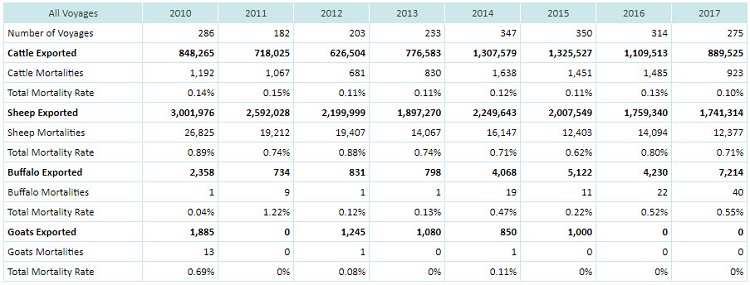A One-Off for the Awassi Express
Why does Emanuel Exports still have an export license? The question was asked by Animals Australia earlier this month after footage on 60 Minutes showed conditions where thousands of sheep died on one of the company's shipments on board the Awassi Express in 2017. Now, it seems the company may have a choice of vessels for over 50,000 sheep being readied for transport to the Middle East.
Initially stopped from loading after the 60 Minutes program was aired, surveyors from the Australian Maritime Safety Authority, this week, verified improvements made to the Awassi Express' ventilation system and endorsed the vessel's Australian Certificate for the Carriage of Livestock. The vessel operator also installed an automatic watering system to ensure water is provided to all pens during the voyage without manual intervention.
The global livestock carrier fleet has been previously cited as the oldest ocean-going fleet - the Awassi Express is a conversion originally built in 1990. Also waiting at Fremantle is the converted livestock carrier Al Messilah built in 1980. Last year, the Australian Maritime Safety Authority found numerous problems with her including:
• Holes corroded in the decks and bulkheads throughout the ship as well as wastage of the supporting structure;
• Multiple issues with the electrical cabling including wasted conduits, improperly mounted cables, exposed wires and unsealed electrical junction boxes;
• Unserviceable generator;
• Damaged bulkhead structure;
• Poor quality repairs throughout the livestock decks.
At the time, the Al Messilah was chartered to carry 75,000 sheep to the Persian Gulf for Emanuel Exports, but her Australian Certificate for the Carriage of Livestock was withdrawn pending the completion of repairs.
The Al Messilah, like the Awassi Express, had received government attention before. A July 2016 voyage for Emanuel Exports resulted in 3,027 sheep (4.36 percent) dying on the vessel as the Al Messilah sailed from Fremantle to the Middle East. In 2006, a voyage from Tasmania saw 1,683 of 71,309 sheep die on board.
According to Animals Australia's review of government records, the directors of Emanuel Exports and associated companies have been involved in over 30 voyages since 2005 on which over 1,000 animals perished on each shipment. Glenys Oogjes, CEO of Animals Australia, says: “For us, this isn’t about the ship, it’s about the exporter. It defies belief that Emanuel Exports may still be granted export permits.”
Whether it is the Awassi Express or the Al Messilah that eventually sets sail for the Middle East, she says that it is symptomatic of the failures that have characterized the regulation of the industry. “Sheep producers themselves are demanding strong action against repeat-offending export companies, yet the regulator continues to take a ‘softly softly’ approach,” she said.
In regulating the live sheep trade, the Department of Agriculture and Water Resources has used above two percent mortality rates in consignments as the trigger for initiating a review of the preparation and management of sheep during voyages. The purpose of the review is to establish whether there were problems in the preparation, selection or management of the consignment prior to export or if disease or other factors caused high mortalities during the voyage.
Mortality report assessments have focused on identifying the causes of mortality and mitigating those risks on future voyages. This system has seen the average mortality rates of exported animals fall over the past six years, said the Department in a statement released after the 60 Minutes program aired.

Source: Department of Agriculture and Water Resources
The Australian Livestock Exporters' Council says the industry has been working to improve mortality rates and explains that the 2017 Awassi Express voyage was a special case. Faced with the 60 Minutes footage, the Council said it was highly distressing and unacceptable to the industry, livestock producers and the community. But, it says, unique risks were encountered. The Awassi Express' first port of call was changed from Kuwait to Doha, Qatar, due to the blacklisting of Qatar by other Gulf Cooperation Council at the time. Kuwait experiences a drier heat which presents fewer heat-stress risks for sheep when a vessel is carrying a full consignment.
Furthermore, sheep supplied by Emanuel Exports for Gulf consignments will now be loaded at 17.5 percent below the stocking density required by the Australian Standards for the Export of Livestock (ASEL).
The Australian Livestock Exporters' Council notes that 3.79 percent of the total consignment of 63,804 sheep died on the 2017 Awassi Express voyage. In 2017, 12,377 sheep died in transit out of a total 1.74 million head exported from Australia, a mortality rate of 0.71 percent. Millions of dollars are invested each year by exporters, and last year, the industry's service provider LiveCorp invested A$1.4 million in welfare programs. Recent research has include an extensive literature review of bedding management and air quality and on-going research and validation of heat stress management models.

that matters most
Get the latest maritime news delivered to your inbox daily.
Skeptical, Lyn White, director of strategy for Animals Australia, believes the industry should be shut down. “Any suggestion that such suffering is not routine, or is a one-off failure of systems, is just a further attempt to deceive,” she says. The whistle-blower who took the 60 Minutes footage also alleged that mortality reports had been falsified. The footage shown on the 60 Minutes program is shocking, she says, but what is equally shocking is that each of these shipments was approved by the Australian government.
With clearance from the Australian Maritime Safety Authority, the decision on whether or not to allow Emanuel Exports' next shipment out of Fremantle now rests with Australia's Department of Agriculture and Water Resources.
